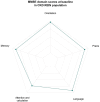A new approach for cognitive impairment pattern in chronic kidney disease
- PMID: 37950574
- PMCID: PMC11181866
- DOI: 10.1093/ndt/gfad244
A new approach for cognitive impairment pattern in chronic kidney disease
Abstract
Background: Chronic kidney disease (CKD) is associated with an elevated risk of neurocognitive disorders (NCDs). It remains unclear whether CKD-related NCDs have a specific cognitive pattern or are earlier-onset phenotypes of the main NCDs (vascular NCDs and Alzheimer's disease).
Methods: We used the Mini Mental State Examination score (MMSE) to assess cognitive patterns in 3003 CKD patients (stage 3-4) followed up over 5 years in the Chronic Kidney Disease-Renal Epidemiology and Information Network (CKD-REIN) cohort. After normalizing MMSE scores to a 0-to-100 scale, the associations between the baseline estimated glomerular filtration rate (eGFR, using the Chronic Kidney Disease Epidemiology Collaboration creatinine formula) and changes in each MMSE domain score were assessed in linear mixed models.
Results: Patients (age: 67 ± 13 years old; males: 65%, mean eGFR: 33± 12 mL/min/1.73 m2) had a good baseline cognitive functions: the mean MMSE score was 26.9/30 ± 2.9. After adjustment for age, sex, educational level, depression (past or present), cardiovascular risk factors and cerebrovascular disease, a lower baseline eGFR (per 10 mL/min/1.73 m2) was associated with a 0.53-point decrement [P < .001; 95% confidence interval (CI) (-0.98, -0.08)] for orientation, a 1.04-point decrement [P = .03; 95% CI (-1.96, -0.13)] for attention and calculation, a 0.78-point decrement [P = .003; 95% CI (-1.30, -0.27)] for language, and a 0.94-point decrement [P = .02; 95% CI (-1.75, -0.13)] for praxis. Baseline eGFR was not, however, associated with significant changes over time in MMSE domain scores.
Conclusion: A lower eGFR in CKD patients was associated with early impairments in certain cognitive domains: praxis, language and attention domains before an obvious cognitive decline. Early detection of NCD in CKD patients must be performed before clinically cognitive decline using preferably tests assessing executive, attentional functions and language, rather than memory tests. This early cognitive screening could lead to a better management of cognitive impairment and their consequences on CKD management.
Keywords: Mini Mental State Examination; chronic kidney disease; cognition; psychometric.
© The Author(s) 2023. Published by Oxford University Press on behalf of the ERA.
Conflict of interest statement
B.S. reports grants for the CKD-REIN cohort study from Amgen, AstraZeneca, Baxter, Fresenius Medical Care, GlaxoSmithKline, Merck Sharp and Dohme-Chibret, Sanofi-Genzyme, Lilly, Otsuka, and Vifor France, Boehringer. Z.A.M. reports grants from NATIONAL RESEARCH AGENCY, during the conduct of the study; grants from Amgen, grants from Sanofi-Genzyme, grants from French Government, grants from MSD, grants and other from GSK, grants from Lilly, grants from FMC, grants from Baxter, grants from Otsuka, grants and other from AstraZeneca, grants from Vifor, other from Boehringer, outside the submitted work. M.P. reports grants from BMS, AstraZeneca and Novartis. D.F. reports grants for other research projects from Fresenius Kabin BBraun, AstraZeneca, Vifor, Astellas and Theradial. C.C. reports honoraria from Fresenius GSK and Amgen. The other authors declare that they have no competing interests. The results presented in this paper have not been published previously in whole or part.
Figures




References
Publication types
MeSH terms
Grants and funding
LinkOut - more resources
Full Text Sources
Medical
Research Materials
Miscellaneous

